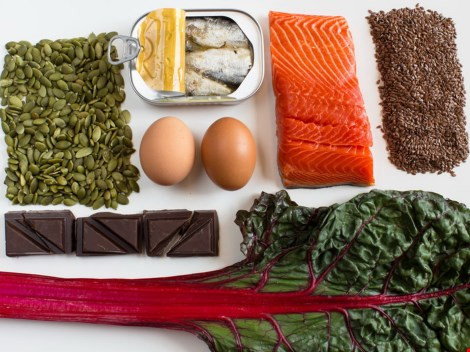What to eat and how to eat to reduce stress?
More than a third of people in a survey conducted by NPR, the Robert Wood Johnson Foundation and the Harvard School of Public Health said they change their diet when they feel stressed.
Many of us turn to sweets or simple carbohydrate foods like croissants or white pasta when we feel stressed.
Professor David Ludwig of the Department of Pediatrics and Nutrition at Harvard University, and a researcher at Boston Children's Hospital, said:
“This can create an unhealthy cycle. When we feel stressed, we reach for foods that will give us instant comfort, but often these foods trigger a spike in hormones and blood sugar that increases our susceptibility to new stressors.”
Of course, we can't control many of the events and situations that lead to stress. But Ludwig says that “the substances we consume can very well cause stress.”
 |
| Foods that can help improve positive mood. |
He points to a study he and a few colleagues published in Pediatrics several years ago. They prepared several different breakfasts for teenage boys. One had protein-rich eggs, one had fiber-rich steel-cut oats. The third meal had instant oatmeal, which had the highest glycemic index.
After eating instant oatmeal which is high in bad carbs, blood sugar levels spike but drop a few hours later. When this happens, stress hormones spike to very high levels.
“We all know that many foods increase the risk of heart disease and type 2 diabetes. So why is it surprising to many people that food also affects mood and emotions?” says Ludwig.
According to researcher Joe Hibbeln, of the US National Institutes of Health, eating a lot of bad carbohydrates and sugar can aggravate the body's stress. "I think there is a very strong connection between what you eat and your mood," Hibbeln affirmed.
 |
| Omega-3 found in fish is said to be very good for regulating mood. Illustration. |
Accordingly, he has spent the past two decades studying the link between omega 3 fatty acids found in fish and human emotions. “One of the most basic ways omega 3 helps regulate mood is by cooling the body's response to provoking factors," Hibbeln said.
He also mentioned trials that showed omega 3 can help the body control symptoms of dementia, along with a study on children in the UK that showed omega 3 helps regulate behavior in children.
But omega-3s are clearly not the only foods that are good for our mental health. Drew Ramsey, a psychologist at Columbia University and author of The Happiness Diet, says a nutrient-rich diet is the best way to beat stress.
He illustrates with his favorite stress-busting breakfast: scrambled eggs mixed with kale (or other veggies) and sprinkled with pumpkin seeds.
Ramsey believes that the meal provides all the necessary nutrients. Eggs are a good source of B vitamins, which are more filling than a carb-rich breakfast. Green vegetables are very nutritious and a source of vitamin A and potassium.
For dessert, reach for dark chocolate, which has a “positive effect on mood,” Ramsey says, citing research that found the pigments in cocoa can boost mood and alertness in people under high mental pressure—like students during exams or journalists on deadline.
According to Health and Life
| RELATED NEWS |
|---|



